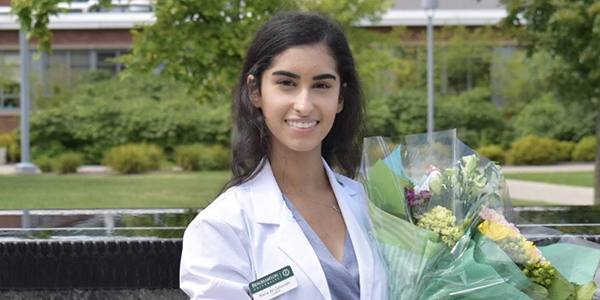Rana Al-Salameh finds enriching summer internship
When internships dried up near her, she found one out of state

Pre-pandemic, P3 student Rana Al-Salameh was looking for a hospital internship for the summer of 2020 so she could gain more experience as a pharmacy intern. But, when the pandemic hit many internship possibilities dried up and she didn’t expect to find one near her home in Oswego, N.Y., let alone in another state.
Looking for any hospitals that were offering internships, she had seen one posted on the School of Pharmacy and Pharmaceutical Sciences listserv. She applied to — and was accepted by — the Yale New Haven Health program in New Haven, Conn., a large hospital system aligned with the Northeast Medical Group. Al-Salameh was assigned to the 500-bed Yale New Haven Hospital Saint Raphael Campus.
But with only two weeks to find a place to live before the internship began, Al-Salameh did have to scramble a bit. “I called everyone to see if they would do a short-term lease. It was really hard to find a place and was more expensive than I thought,” she said. “Due to the pandemic, no one wanted to do showings, but I found a place within walking distance in the city of New Haven. It was a downtown apartment right next to the Yale Center for British Art. It was a great town and I really loved it.”
She filled a lot of different roles during the three-month period she was at Saint Raphael, and continues to work for them every fourth weekend.
As one of about 15 interns, Al-Salameh would log into her account each day and be assigned to a treatment team. Providers, mainly nurses, would reach out to the interns via a Mobile Heartbeat smartphone app for secure texting, phone calls, patient-specific alerts and other necessary communications. “It was a new experience to have a provider or nurse reach out directly to me,” she said. She could have multiple tasks to complete, including non-sterile compounding.
“I was definitely prepared for the compounding,” she said, crediting School of Pharmacy faculty for what she had learned. “I remembered everything they taught us about keeping everything neat and paying attention to every step, and wanting your patient to get the maximum dose and up to your standards.”
Other assignments, behind the scenes, Al-Salameh said, included breaking out into satellite rooms with pharmacists and working with them on whatever unit they were covering for the day. “The majority of the time was spent in the inpatient pharmacy,” she added. “I learned how to function and fill the carousels and the medicine machines on each floor, stocking them with medications and narcotics.
“I also learned how to stock code carts,” she said. “Checking expiration dates is extremely important for code carts,” which are pulled into use in critical situations.
Because the inpatient pharmacy was in the basement of the hospital, Al-Salameh also learned to use its pneumatic tube system to send medications to different parts of the hospital when there wasn’t time or there was no point in someone coming all the way down to the basement. “It was pretty cool,” she said.
“This internship allowed me to feel prepared during this pandemic and experience inpatient pharmacy during a very challenging time,” she said. “It taught me how to time manage and prioritize what is the most important thing and go from there.
“There is time management in retail, but this was a different kind of stress, assigned directly to a patient,” she said. “Some floors busier than others, depending what floor you were assigned to, but it was always important to stay focused and be organized.”
Before she began pharmacy school, Al-Salameh, whose sister is a clinical pharmacist at a VA hospital, worked as a pharmacy technician and has also completed her community rotation. With her summer internship complete, she said she prefers the hospital setting, which offers more of the behind-the-scenes aspects of patient care.
“It’s more patient-centered in acute or severe disease states,” she said. “Retail targets more of the chronic care management, especially with Medication Therapy Management (MTM) services provided to customers. I liked the whole hospital process. I didn’t get to “round” with physicians that much, but it would be interesting to do because you can physically see what is going on with the patient and give input that other providers can’t. That’s really different than retail.”
Al-Salameh appreciated the “safety huddles” she experienced during her hospital rotation. “At the beginning and end of a shift, we had a meeting via phone with the other hospitals in the system, as a way to stay on track,” she said. “It was a great way to interact with the other hospitals.”
Looking to the future, Al-Salameh, who has been a student ambassador for the School of Pharmacy since her first year, is definitely interested in a residency, though hasn’t yet made a final decision about a specialty. “I’m interested in infectious disease or health informatics, so I’ll wait until my APPE rotations to see what interests me the most,” she said.
Until then, she’ll continue with her studies, and playing tennis and weightlifting in her off time. “My brothers got me into it!” she said.
